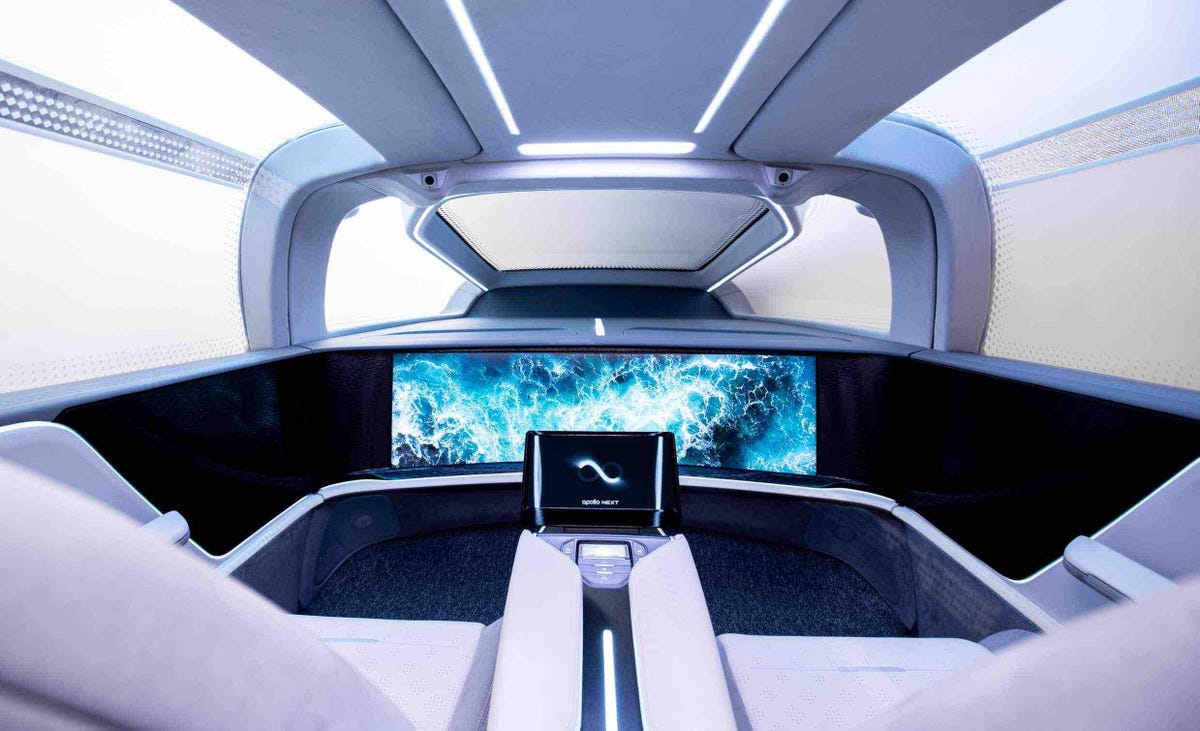Baidu unveils concept autonomous ‘Robocar’ | ZDNet

The interior of Baidu’s concept car, the Robocar.
Image: Baidu
At Baidu World 2021, the Chinese technology giant unveiled a concept autonomous vehicle called the Baidu Robocar.
The Robocar is touted as being able to independently drive with the same capability as a human driver. While that description would classify it as being a Level 5 autonomy vehicle, which is meant to represent a fully autonomous vehicle that can go anywhere and at any time, Baidu did not make that claim at its tech conference.
There are currently no Level 5 autonomous vehicles out in the market, with most robotaxi services currently using cars with a Level 4 autonomy. A car with level 4 autonomy can “perform all driving tasks and monitor the driving environment” but only in certain circumstances. For example, Waymo’s robotaxi at times stops driving whenever it is near traffic cones and blocks traffic.
In a demonstration of the new vehicle driving on roads, Baidu showed the vehicle could make U-turns, adapt its driving directions when a user chose a new location, and swerve around obstacles in real time.
“You can really take a nap during your travel and the space is big enough, you can even stretch your body inside the car,” a Baidu spokesperson said while performing the demonstration.
Baidu also announced it will be expanding its Apollo Go robotaxi service, which hit Beijing streets in May and was the first available paid robotaxi service in China. With the expansion, Apollo Go will now be renamed to Luobo Kuaipao instead, which means “radish runs fast”.
According to Baidu, Apollo Go was the company’s trial service where the priority was to test and verify technologies. With the Luobo Kuaipao rebrand, the company said it now plans to move into a “large-scale expansion of [its] autonomous driving services with a focus on user experiences, fleet deployment, and commercialisation”.
Two months ago, Baidu inked a partnership for state-owned manufacturer BAIC Group to build 1,000 autonomous vehicles over three years for its robotaxi service. The robotaxis are being produced at 480,000 yuan (around $75,000) each, which it touted at the time as being a third of the average cost for manufacturing a Level 4 self-driving vehicle.
Baidu also said it has started to mass produce the Kunlun II, the second-generation version of its AI chip. The chip will use 7nm process technology, with Baidu saying its computational capability will be around two to three times better than the original Kunlun chip. It will be used for autonomous driving, smart traffic, and smart assistants, among other use cases, Baidu said.
Last week, Baidu posted its second-quarter results, with the company revealing its year-on-year earnings dropped by almost 4 billion yuan, amounting to a net loss of 583 million yuan. This was despite revenue climbing 20% year-on-year to 31.4 billion yuan.
Related Coverage
For all the latest Technology News Click Here
For the latest news and updates, follow us on Google News.
